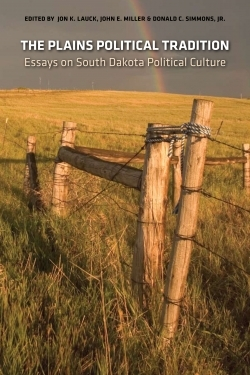The Plains Political Tradition
Essays on South Dakota Political Culture
South Dakota’s unique political culture is examined in this collection of twelve scholarly essays that address the state’s sociopolitical dynamics. Editors Jon K. Lauck, John E. Miller and Donald C. Simmons, Jr. have all written extensively about the state. This book contextualizes the particulars of South Dakota’s political history and informs readers about the broader story of American democracy. The events, traditions, and movements within the borders of this state since its 1889 establishment broaden the popular view of South Dakota as staunchly conservative and Republican.
In these essays, South Dakota is revealed as a place where populist politics, left-wing liberalism, and Indian activism have all been deployed for political gain. Lauck identifies three “political subcultures” within the state and discusses the politically dominant “East River” area—still overshadowed by its Anglo-American Republican roots. John Miller explores the state’s history of political platforms, dividing them into seven eras that meticulously describe the phenomenon of “punctuated equilibria” within the state. William Pratt ferrets out a colorful history of radicalism evinced in such primary source material as archival documents, newspapers, and interviews.
Subsequent essays explore the role of immigrants, women, literature, the Cold War, environmentalism, American Indian activism, and rural vs. urban interests. In the final piece, Jon Schaff analyzes several recent US congressional elections, wherein South Dakotans demonstrated their favor of local, self-government by voting out four incumbent senators who were perceived as aligned too closely with national interests.
Whether discussing how the violent tactics of the American Indian Movement figured into the 1973 Wounded Knee occupation of Pine Ridge Indian reservation, or how political platforms have created a conservative stability that is sometimes violated by radicalism, The Plains Political Tradition reveals a state that embodies the dual legacies of liberal grassroots activism and political conservatism. South Dakota’s constituents have both resisted outside interference and have sought federal assistance (most notably in the 1980 Supreme Court ruling that granted compensation to the Great Sioux Nation for the illegal taking of the Black Hills). This collection of essays honors these political anachronisms and authoritatively meets its goal to, “integrate and synthesize [South Dakota history] and locate it in the broader context of American history.”
Reviewed by
Kai White
Disclosure: This article is not an endorsement, but a review. The publisher of this book provided free copies of the book and paid a small fee to have their book reviewed by a professional reviewer. Foreword Reviews and Clarion Reviews make no guarantee that the publisher will receive a positive review. Foreword Magazine, Inc. is disclosing this in accordance with the Federal Trade Commission’s 16 CFR, Part 255.

